VietNamNet Bridge – The Ministry of Education and Training has approved a new general education programme, focused on reducing the number of subjects and periods.

The Ministry of Education and Training has approved a new General Education Programme with focus on reducing the number of subjects and periods. — VNA/VNS Photo
Subjects are divided into two types – optional and compulsory subjects and activities – different from a draft programme published months ago.
At primary school, compulsory subjects and activities include maths, Vietnamese, foreign languages (grade 3, 4 and 5), ethics, nature and society (grade 1, 2, 3), science, history and geography, computers and technology (grade 4, 5), physical education, arts and experience activities.
Compared to the draft, time for ethics has been cut by half for grade 1, 2 and 3, while the number of computer and technology periods has been slashed by half to 70 periods a year.
According to the programme, each school day is broke into no more than seven periods. Each period lasts from 35 to 40 minutes with breaks between periods.
Secondary school subjects include literature, maths, foreign language 1, civic education, history and geography, natural sciences, computers, technology, physical education, arts and experience activities.
Civic education periods for grade 8 and 9 have been cut from 52.5 periods per year to 35 periods per year. The number of technology periods was reduced from 52.5 periods per year to 35 periods per year at grade 6 and 7 and from 70 periods per year to 52 periods per year for grade 8 and 9.
Computers, physical education and technology are taught by modules.
There are different experience activities for students to select and schools to offer based on their capacity.
At high school, literature, maths, foreign language 1, physical education, national defence and security education, experience activities and local education are compulsory.
The education design for this level is profession-oriented modules. Each subject has a group of modules, aiming to help students improve their knowledge, experiment and apply knowledge to solve practical problems.
Each module will have 10 to 15 periods. The total time for each subject’s modules is 35 periods.
Professor Nguyen Minh Thuyet, the programme’s chief technical officer told Tuoi Tre (Youth) newspaper that after consideration, the programme compiling committee reduced lesson times to ensure relevance with Viet Nam’s conditions.
He noted that the programme was designed for educational facilities with two classes per day and is designed flexibly for those without conditions to teach two classes per day.
To improve quality, schools need to change organisational methods and teaching methods, he said.
He said that after the assessment council held their first meeting, the compiling committee started to identify requirements and outcome standards for each subject and plans for the content.
The committee will invite experts this month to discuss each subject’s programme and ask for public comments. After the subject programme is approved, textbook compilation will start, he said.
Nguyen Van Ngai, former director of HCM City’s Department of Education and Training, said that the new programme is packed.
“I am looking forward to detailed programmes for each subject. I hope that it will be filtered and compiled with more practical issues for students, not full of knowledge and academics like the old programme,” he said.
Meanwhile, teacher Nguyen Thi Minh Tam, vice principle of Tan Tuc High school in HCM City, said that three English lessons per week is still too little for students to learn English listening, speaking, reading and writing. She proposed at least six periods per week.
VNS